With an annual revenue that is quickly approaching $100 billion, online ticket sales are a significant piece of the pie of overall ecommerce revenue across any industry.
A large portion of these ticket sales happen on the aftermarket, which is in part driven by individual ticket resellers who are able to capitalize on the demand and price volatility to make a profitable online ticket reselling business.
In this guide, we’ll go over all of the aspects of reselling tickets online, including methods that profitable ticket flippers and brokers use to become successful, including the best online platforms that you can use to do the same.
Why Resell Tickets Online?
It’s likely that you’ve had the experience of going online to buy a ticket for an event, only to find out that the original tickets have completely sold out and are going for a premium on the aftermarket.
While this is a cause for frustration, approaching this situation with curiosity rather than anger will allow you to realize that these people who are reselling tickets are mostly individuals who learned how to make money selling tickets, and with the right information, you can do the same.
As someone who learns the ins and outs of the ticket reselling game, not only will you be able to create a side hustle or fully-fledged business from the online ticket market, but you’ll be able to secure the best prices for tickets of events that you want to go to.
Is Ticket Reselling Really Profitable?
The short answer - yes, ticket reselling is profitable. The ticket aftermarket is volatile, meaning that there is a large price fluctuation for the exact same tickets that resellers can take advantage of and profit from with the traditional buy low, sell high mindset.
In terms of profitability, the first metric to consider is the profit margin or overall price increase of a ticket. Most tickets to a popular event will see a price increase of about 20%, meaning that for a $80 ticket, there will be a $16 profit, minus any platform fees. However, experienced ticket resellers will track and find events that have much higher profit margins, as high as 50-200% or more, and if you are able to get multiple tickets at good prices, you can have a nice payday as a ticket reseller for an event like this.
Let’s dive in now with the steps that you can take to resell tickets online.
How to Resell Tickets Online

Reselling tickets profitably isn’t easy as a beginner, and finding success takes a strategic approach.
Here’s an exact step-by-step process that you can follow to get started in reselling tickets online the right way:
Step 1: Understand the overall ticket market
The first step to reselling tickets is gaining an understanding of the overall ticket market and how it works.
One of the first things you should know about the ticket market is its incredible volatility, which is what provides the potential to make profits but is also what might make it difficult to understand which events to target and how you can best secure tickets at profitable price points.
You should know that the ticket market also experiences seasonality. Examples of this include live music events and festivals peaking during summer months, and each sport having its own peak time frame and interest based on their annual schedule.
Another important consideration is the legality of reselling tickets, which will vary by region and which strategy you choose to use, so be sure to read up on your regional laws in this area so you can approach this game correctly. Some regions have strong anti-scalping laws and pricing guidelines, while others are much more lenient, so understanding your local rules is crucial to avoid any potential legal issues or blockages to conducting business freely as a ticket reseller.
Step 2: Perform price research
Finding profitable opportunities for selling tickets online starts with effective price research. You can start by browsing a ticket marketplace for prices of the most popular upcoming events, and compare the current prices to the initial ticket price or any historical data if you can find it. Notice how the pricing changes over time, and you can calculate how much people might be profiting if they resell tickets from these events.
While you can use spreadsheets to manually compile and track data to formulate a good approach for when and how to buy tickets at profitable price points, you can also take advantage of tools that will make your life easier.
Tools to use for ticket reselling price research
Here are some tools that you can use to perform effective ticket pricing research:
TicketIQ

TicketIQ is a ticket reselling platform, and although it’s not the most popular place for buying and selling tickets, it’s known for its comprehensive database of historical ticket prices for a wide range of popular events which can help you to predict future price movements and consumer behavior for similar current events.
You can also use TicketIQ to track the price of specific tickets over time, which can help you find the best moment to buy or sell for profit.
TickPick
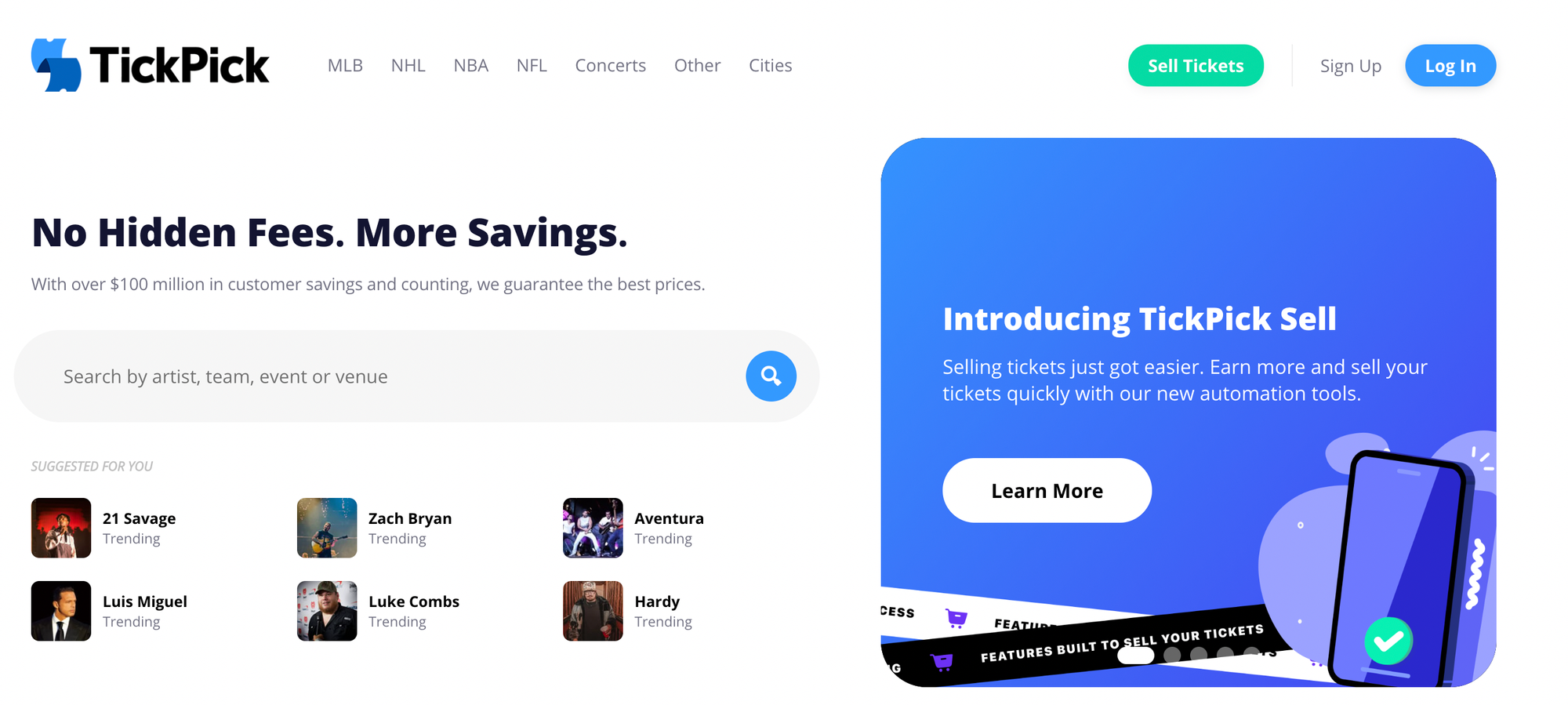
Another no-fee ticket-selling platform and aggregator that can be used for price research is TickPick. You can use it to compare prices for the same event across multiple platforms, which gives you a quick snapshot of the overall market and any potential arbitrage opportunities between platforms.
TickPick also maintains a database of historical pricing, which you will gain access to for free if you sign up as a member. In addition to seeing past data of any currently listed ticket, the platform also gives a “Best Deal” indicator based on current prices and seat locations in addition to allowing you to track pricing over time.
Other built-in platform tools
Most major platforms for ticket reselling also come with built-in tools that you can use for pricing research, which includes SeatGeek’s Deal Score, Stubhub’s interactive seat maps, and a rich analytics dashboard that Eventbrite provides to report real-time data on ticket sales performance.
Google Trends
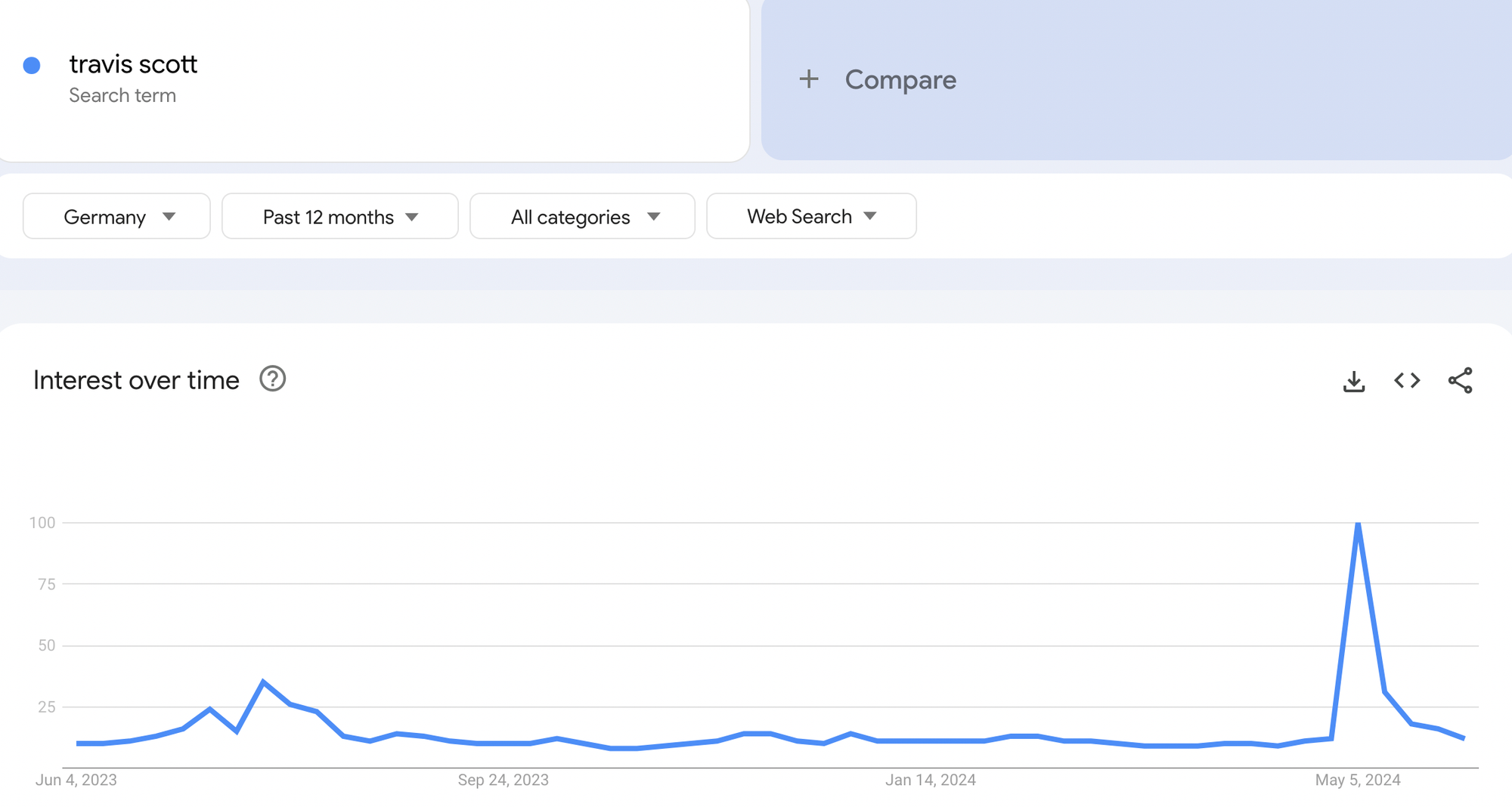
If an upcoming event is hyped enough to demand resale value, it’s definitely going to show up on Google Trends. Simply head over to the Explore page of Google Trends and you can search for artist names and concerts that are happening. Pay attention to any sudden rises in searches for a certain sports or concert event, and compare whether or not the rise in interest has transferred to a pricing increase. If the price of the tickets hasn’t yet increased but the demand on Google trends has, this could be a good sign that ticket prices might rise.
Ticket reselling communities
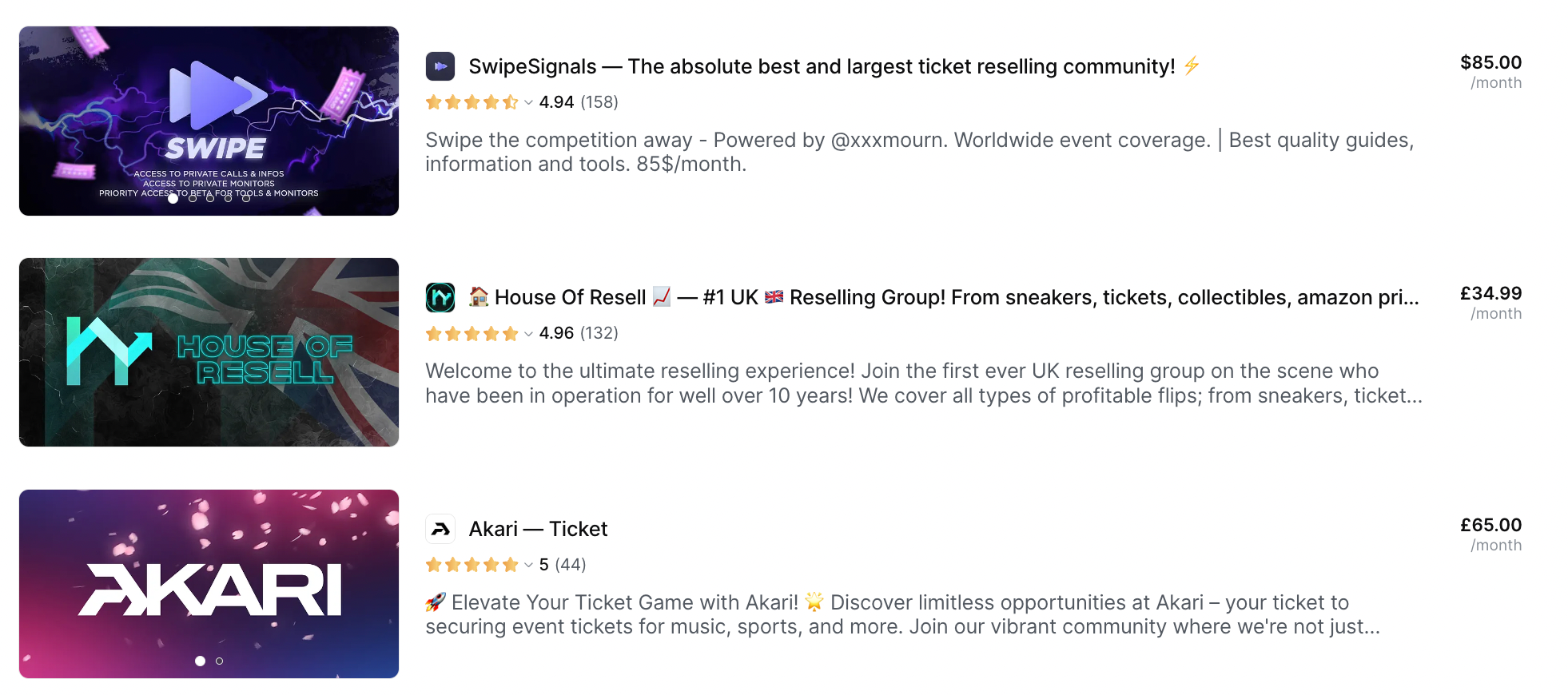
Instead of taking on the research alone, why not join a community dedicated to ticket reselling? In this communities the groups leaders teach you how to find the best opportunities for ticket flipping, as well as sharing their best ticket finds so that you can take part of the action too. These communities are paid, but it saves you from using platforms and Google to conduct hours of research by yourself.
Step 3: Understand the different categories of ticket reselling
As a ticket reseller, you’ll be able to target tickets in numerous categories. Here is a summary of the top ones and how you can approach each differently:
Reselling concert tickets
When it comes to reselling concert tickets, you should focus on popular artists with a cult following. Be sure to follow them on social media and subscribe to any of their mailing lists to get announcements regarding ticket release dates. With concert tickets, you can also join fan clubs to potentially get access to presale tickets so you can get tickets at their initial face value before the general public frenzy which gives most people an incredibly slim chance at doing the same. Credit card companies like American Express and Mastercard offer entrance to select fan clubs as a membership perk for certain card holders.
Due to the controversial press surrounding tickets and resellers for Taylor Swift’s Eras tour, being well informed in this area is especially important.
Reselling sports events tickets
One of the most important things to pay attention to when selling sports events tickets is seasonality and historic games. Apart from obvious annual events like the NFT Superbowl, NBA All-Star Weekend, or the FIFA World Cup, pay attention to pivotal games between teams that have a huge build-up and demand. This can come in the form of an ongoing rivalry or redemption.
Another strategy that is unique to sports tickets is investing in seasonal tickets for popular teams and selling individual game tickets separately. This is possible with most teams and sports, but be sure to double-check the terms and conditions when buying seasonal tickets to confirm that you’re able to execute this strategy profitably.
Reselling theatre and live event tickets
While this category doesn’t have the most volume and is only concentrated in major cities, reselling theatre tickets to trending live shows can be a good strategy with less competition. Consider buying and selling tickets for events on Broadway or at the London Theatre.
In addition to shows, pay attention to any celebrity speaking tours or comedy events that are being headlined by trending names.
Step 4: Get to know all of the best ticket-reselling platforms
If you want to come on top in the ticket reselling business, you’ll need to familiarize yourself with all of the best ticket reselling platforms.
You might be familiar with some big names such as Ticketmaster, and you’ve very likely already been a customer yourself, but you should also know that signing up as a seller on these platforms is often free and quick to do so. It’s also good to get familiar with other platforms that are legit for ticket reselling, including Vivid Seats and StubHub.
Let’s continue by going over each of the features of the top platforms for ticket reselling so you can build a good knowledge base right here with this guide.
Where is the Best Place to Resell Tickets?
We’re far beyond the days of getting tickets from a single box office– since the early 2000s, many platforms have emerged online that support the sales of tickets on the aftermarket.
Choosing the right platform to resell your tickets on will help you to maximize profits and have a good experience as a ticket reseller. While most platforms are fairly similar, it’s good to have a general overview of each of them, including their unique features, benefits, and potential downsides to using them.
Here’s a list of the top 5 places to resell tickets online:
Ticketmaster
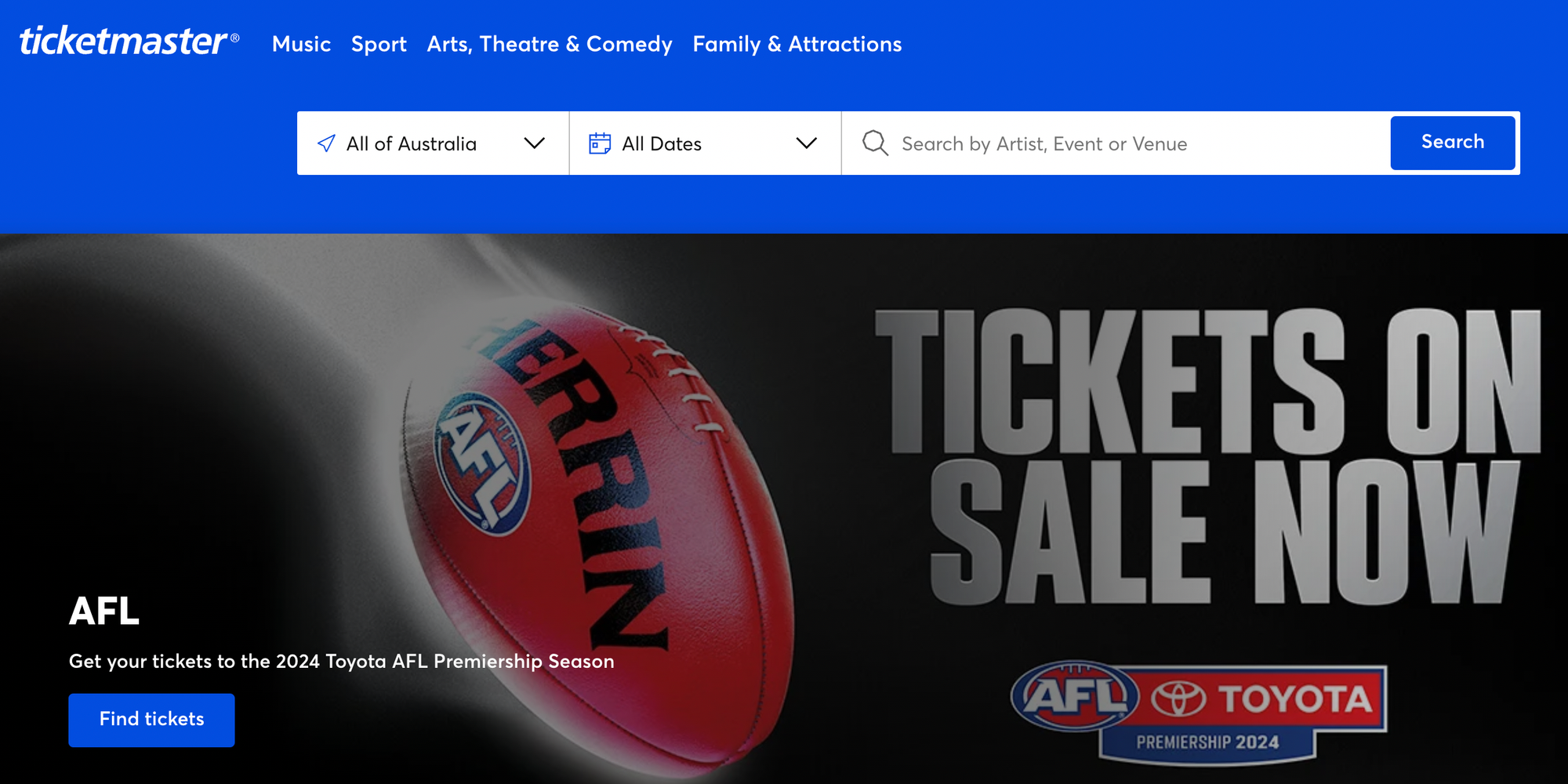
One of the largest and most trustworthy ticketing platforms globally is Ticketmaster. It’s known to have an extensive inventory of tickets across a broad set of categories, including concerts, sports, live theatre shows, festivals, and more. Ticketmaster has the greatest coverage of any other online ticketing platform, including North America, Europe, Australia, and parts of Asia.
The platform has both primary ticket sales and secondary ticket sales, so it’s a popular place for both buyers and sellers. One of its standout features is its Verified Resale program, which ensures that all tickets sold or resold on the platform are 100% authentic, which makes it attractive to both buyers and sellers.
In terms of a platform commission, Ticketmaster charges a variable fee, which can range from 10% to 20% for sellers, depending on the event type and ticket price.
Pros:
- Trustworthy platform recognized by word of mouth
- Broad global audience
- Verified resale program ensures ticket authenticity
- Also has primary ticket sales
Cons
- Higher fees compared to other platforms
- Strict listing and selling policies
- Was involved in one of the greatest recent controversies surrounding the Taylor Swift Eras tour
SeatGeek

Known for its sleek user-friendly interface and robust pricing tools including an aggregator of listings from multiple sources, SeatGeek is a newer marketplace that has quickly risen as a top choice for ticket buyers and sellers alike.
Key features include its Deal Score which grades how well a ticket is priced compared to the same or similar tickets on the aftermarket, and a price prediction feature which helps buyers make a good buying decision and sellers know when and how they should make listings.
The platform has also secured partnerships with many professional sports teams in the US, including the NFL, NHL, MLB and NCAA, making it a top choice, especially if you operate in America. Their international presence includes Canada and is expanding to more countries soon.
SeatGeek charges a 10% commission fee to sellers for each ticket sold, with a flat fee of $10 per ticket, making it cheaper to sell more expensive tickets compared to other platforms which charge a higher commission.
Pros:
- Pleasant and easy-to-use interface
- Comprehensive market view complete with price aggregation
- Partnerships with major US sports organizations makesit a top fan pick
Cons
- Coverage currently only in US and Canada
- Ticket selection can be limited
- Reports of customers getting seats that aren’t as described
StubHub
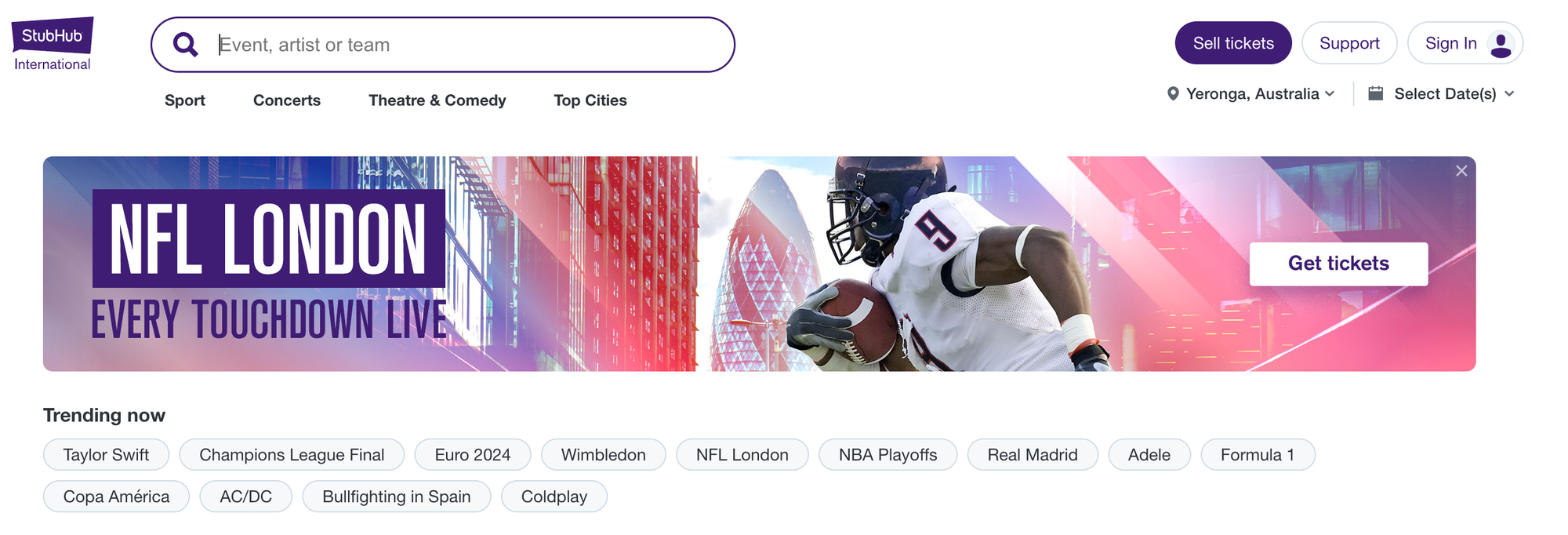
StubHub, which used to be owned by eBay, is an online ticketing platform that is reseller-friendly. It has global reach, with coverage in North America and parts of Europe and Asia, making it a great pick for international ticket resellers.
The platform has buyer protection, which offers a guarantee of authentic tickets from sellers. However, some buyers have reported that this guarantee isn’t as good as some other platforms and that the customer service might be slow to address an issue or offer a refund. For sellers, signing up is quick and easy, and listing a ticket is possible with just a barcode. You’ll also be able to view helpful metrics about ticket demand, including the number of views for a specific event and its tickets.
A flat commission fee of 15% is charged for tickets, which is deducted from the overall sale price of the ticket. Additional charges for shipping and delivery are made for physical tickets, but now, most buyers and sellers have shifted towards digital tickets.
Pros:
- Fast and easy to signup with relaxed selling requirements
- Can sell using only a barcode
- Metrics include being able to see the amount of people viewing an event
Cons
- Higher fees than other platforms
- Buyer protection isn’t completely guaranteed
- No guarantee for the exact location of seats for buyers
Vivid Seats

Founded in 2001, Vivid Seats is another reseller-friendly ticketing platform that has coverage for several types of popular events in the US and Canada.
One of its main benefits for online ticket sellers is its reward program which rewards active and high-volume sellers, with perks like fee discounts and an exclusive dashboard SkyBox, which allows users to list and manage ticket inventory across multiple platforms, including Ticketmaster and Stubhub for maximum exposure.
Creating a listing is also much easier than other platforms–you don’t even need to upload a PDF or barcode, they allow listings with manual entry with the option to upload details later.
While it’s incredibly seller-friendly, it doesn’t have the largest user base of buyers, some of whom report frustration surrounding the lack of customer service and confusing buyer fees.
A flat 10% fee for sellers makes it one of the most cost-effective compared to other platforms, however, it lacks the volume of more popular platforms.
Pros:
- High degree of seller friendliness, with a fast sign-up process and ability to quickly create manual ticket listings without uploads
- Low, 10% flat fee for selling
- Incentives for active and high-volume sellers, including the ability to list and manage inventory across multiple platforms
Cons
- Poor customer service made up of mostly automated generic replies for both buyers and sellers
- Hidden fees that increase price discourages buyers
- Payout method for sellers is PayPal only
TickPick
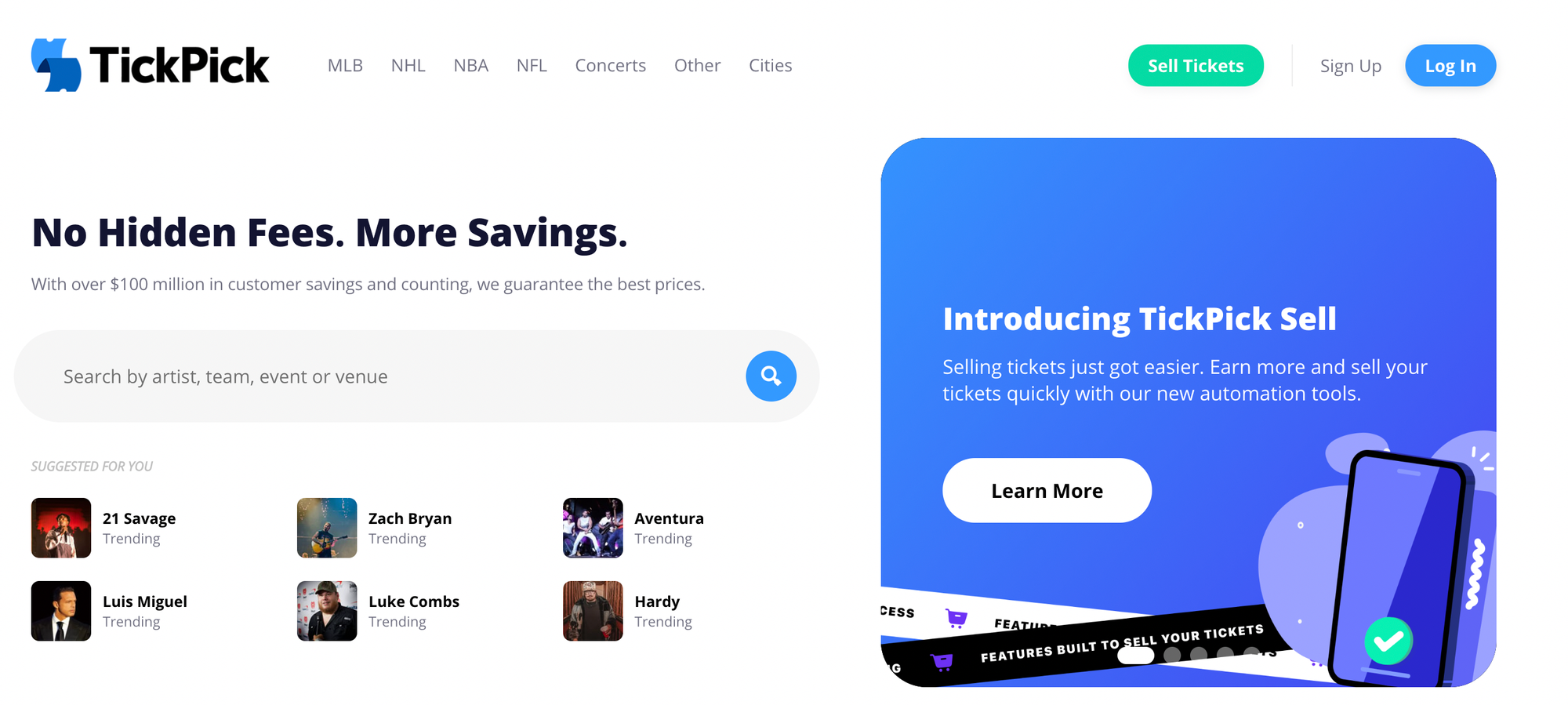
One of the newcomers to the online ticket reselling scene is TickPick, which was founded in 2011.
Its competitive advantage lies in its no-fee pricing model for buyers. The transparency of this type of pricing is refreshing compared to other platforms which include fees that are either high, confusing, or both.
For sellers, there is a 10% flat commission for tickets sold, which is the cheapest it gets for ticket resellers.
Sellers also benefit from comprehensive market data, which includes historical price information and analytics across all platforms, making it a good place for researching the overall market viability and pricing of any ticket.
TickPick only currently offers coverage in the US and Canada, and while it’s growing fast, it still doesn’t have the same buyer volume as other top names like Ticketmaster, Stubhub, and Seatgeek.
Pros:
- No fees for buyers
- Industry-leading 10% flat commission for sellers
- Free access to comprehensive market data, including historical pricing, for all registered users
Cons
- Coverage limited to US and Canada
- Limited buyer demand
- No direct communication is possible between the buyer and seller, making it difficult to resolve concerns
Learn Ticket Reselling Tips, Tricks, and Strategies with Whop!
Becoming a profitable ticket reseller is possible with the right approach, and although it’s possible to win the game, it comes with many hurdles such as missing out on profitable opportunities, being stuck with tickets that must be sold at a loss, or encountering issues with ticket reselling platforms.
Mastering the game of ticket reselling alone is difficult, but with the right help, you can shortcut your way to success, avoiding costly pitfalls and the extra time it takes to learn all the ins and outs of the fast-paced, dynamic form of reselling.
Learning inside of an expert-led group is possible right here on Whop’s marketplace, where thoroughly vetted pros lead the way to grow a new crew of online business owners who are profiting from the lucrative market of ticket reselling.
So, if you want to get started on this exciting and profitable journey, check out our top groups for ticket reselling here today, and if you want to check out all groups that cover this area and more, browse all of your options that will get you off to the right start here!
Reselling Tickets: Commonly Asked Questions
What is ticket scalping?
Ticket scalping is the act of buying a ticket to a popular event with the direct intention of flipping them quickly for a profit. This term is more associated with practices that are generally considered unscrupulous, which might include overinflation of prices and unfair usage of grey methods such as bots. Ticket scalping is also sometimes performed outside of trusted marketplaces, making it less regulated than ticket reselling on trusted platforms.
Is ticket reselling legal?
The legality of ticket reselling can be a bit of a grey area and varies depending on where you live and the methods you use. Some regions have strict anti-scalping laws, while others are more lenient and allow all types of ticket reselling within a fair market price. Specific laws are always changing and can even vary by platform, so be sure to check with your local jurisdiction and its exact laws before you jump in to reselling tickets.
How do you make money reselling tickets?
The key to making money as a ticket reseller is buying tickets that are either immediately profitable or will be in the near future. In order to find tickets to buy that will make you money, you’ll need to be strategic. Start by identifying events that are likely to have high demand and the potential for price increases, then use methods to acquire these tickets at face value or at a profitable aftermarket price. From there, you need to pick a good channel to reach buyers, which is most often a reputable online ticket sales platform.
How much money can you make with ticket reselling?
Ticket resellers make money from their profit margin on the tickets that they’ve sold, which is based on the type of event and its popularity. Part-time ticket flippers who track profitable events and get one or two tickets can make a side hustle of $100-$500 per month, but full-time, higher-volume resellers can make well over $1000 per month on average. In addition to paying attention to seasonality, it’s also important to get familiar with all ticket reselling platforms and their rules and fees as well in order to generate the best profits.
What's the best way to resell tickets?
Top ticket resellers operate with an exact strategy, which begins by approaching the market with knowledge to spot and act on profitable opportunities. Over time, you’ll learn how to get as many tickets as possible for face value for events that are the most likely to see an increase in price. In order to sell the tickets for the most profitable price, you’ll need to list them on trusted high-traffic platforms like Ticketmaster and SeatGeek, and set competitive yet profitable prices. Starting small and scaling as you gain skills and capability is the most efficient path to reaching a full-time income as a ticket reseller.


![Top 18 best ticket reselling Discord servers [November 2024]](/blog/content/images/size/w600/2023/12/Top-Ticket-Reselling-Discord-Servers--1-.webp)
![Top 22 best sneaker reselling Discord servers [2024]](/blog/content/images/size/w600/2024/01/sneaker-reselling-discord.webp)
![Top 26 best reselling Discord servers [November 2024]](/blog/content/images/size/w600/2023/09/reselling-discords.webp)
